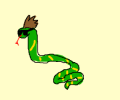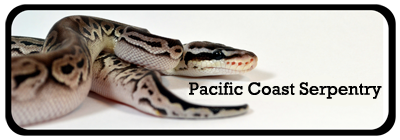» Site Navigation

0 members and 2,182 guests
No Members online
Most users ever online was 6,337, 01-24-2020 at 04:30 AM.
» Today's Birthdays

» Stats

Members: 75,079
Threads: 248,524
Posts: 2,568,620
Top Poster: JLC (31,651)
|
-
Feeding a captive snake wild mice?
I'm asking this question for my mother in law to be....
She has a mouse problem in her attic.
I have snakes that eat mice.
But, my snakes are in captivity, and have only eaten mice that were also bred in captivity.
Apart from knowing these mice are in the attic, I don't know what they eat or what health they are in.
Mother in law to be wanted to know if I can feed these mice to my snake, if she catches any. I said probably not, since they could have diseases my snakes have no immunity to, since they're not in the wild as well.
Was this the right answer?
I'd appreciate any insight you can offer.
Thanks,
Shellie
2.3 normal ball pythons
.1 ultramel motley het caramel corn snake
1. butter motley het caramel+stripe corn snake
1. fiance  I had to rehome my kitty, and my dog got cancer and we put her down. RIP.(Did I forget anything??  )
-
The Following User Says Thank You to shelliebear For This Useful Post:
-
I've been seeing this question an uncomfortable amount of times lately 
Wild mice are riddled with disease and parasites...would you really feed that to your snakes? I'd say your answer was correct.
Last edited by Skittles1101; 12-02-2011 at 04:47 PM.
2.0 Offspring, 1.1 Normal Ball Python, 1.0 Pastel Ball Python, 0.1 Albino Ball Python, 0.1 Pinstripe Ball Python, 0.1 Banana Ball Python, 1.0 Pied Ball Python, 1.0 Normal Hognose, 0.1 Veiled Chameleon, 0.0.1 G.pulchra, 0.1 P.metallica, 0.1 M.giganteus
-
The Following 2 Users Say Thank You to Skittles1101 For This Useful Post:
se7en (01-24-2016),shelliebear (12-02-2011)
-
Re: Feeding a captive snake wild mice?
Definitely not. Disease, parasites, and potentially hazardous chemicals that they have ingested either by chewing on crap around the house, or actually eating poisoned rodent bait.
-
The Following 3 Users Say Thank You to JLC For This Useful Post:
Albert Clark (01-24-2016),cristacake (01-24-2016),shelliebear (12-02-2011)
-
Re: Feeding a captive snake wild mice?
I asked this question a couple weeks ago and I will tell you what everyone told me. Wild mice carry diseases and parasites, don't do it!

0.1 Normal (Captain Hook) (Hooked deformation on tip of tail)
1.0 Pastel Poss het Albino (Thor)
0.1 Normal (Chloe)
0.1 Tiger Reticulated Python (Jade)
0.1 Borneo Black Blood Python (Kira)
Coming soon:
1.0 Mojave het Albino
0.1 Mojave het Albino
-
The Following User Says Thank You to evan385 For This Useful Post:
-
Sorry, computer is very very slow, can not browse through pages at the moment to see other threads like this, I'm lucky the create thread page loaded as it is 
that's what i was thinking as well, i just wanted to double check because that would be a perfect solution if the mice were healthy, but i doubt they are
thank you and sorry for duplicate question :p
2.3 normal ball pythons
.1 ultramel motley het caramel corn snake
1. butter motley het caramel+stripe corn snake
1. fiance  I had to rehome my kitty, and my dog got cancer and we put her down. RIP.(Did I forget anything??  )
-
-
very much appreciated, now i dont feel like a dum-dum since i know i made the right decision 
2.3 normal ball pythons
.1 ultramel motley het caramel corn snake
1. butter motley het caramel+stripe corn snake
1. fiance  I had to rehome my kitty, and my dog got cancer and we put her down. RIP.(Did I forget anything??  )
-
-
BPnet Veteran


As everyone else has said, you said the right thing? You could tell her it is less work and money for you to just buy feeder mice. My question would be how would she catch them and keep them to give them to you to feed off.
Last edited by Driver; 12-02-2011 at 10:34 PM.
-
-
Registered User


 Re: Feeding a captive snake wild mice? Re: Feeding a captive snake wild mice?
I would like to chime in on this thread because every person I see speaking on this topic says the same thing: "Wild mice could have parasites and diseases that could hurt your snake!!!!" etc.
First of all, reptiles cannot get certain diseases that mammals can. I am certainty not an expert on this subject, but until I see someone posting some laboratory research on this topic of which parasites and diseases you are talking about and showing that said parasites and diseases are harmful to reptiles I am going to be skeptical about it. Snakes in the wild eat wild mice exclusively and people have witnessed plenty of adult snakes so there is at least some proof snakes can eat wild mice. They have highly acidic digestive systems that I can only imagine will disinfect much of what they eat even if it was diseased. It is hard for me to imagine that feeding a captive snake a few wild mice every now and then will effect it's health too much. Furthermore, just like any animal they have immune systems. Snakes have a tolerance for parasites and bacteria that they ingest every day. Nothing is 100% sanitary. Snakes must be at least somewhat resistant to diseases they encounter in the wild. They do have quite a long life span.
In the southeast we eat all kinds of wild animals that we cook thoroughly and no one ever gets sick from it. Perhaps if you really wanted to be sure you could boil cook the mice and then let them cool to serve to your snake as it would kill any parasites or bacteria living in them. You would probably have to make sure to use a thermometer to check the boiled mouses internals after though to make sure you weren't going to burn your snake. I think that underneath all these cliche responses is a reoccurring theme that eating anything from the wild is toxic and risky. I think people are too spoiled these days in thinking that everything is clean and sanitary coming from factories where things are made artificially while not realizing the FDA and other regulations allow for things like bug parts per million to be allowed into our food.
Would I feed wild mice to my snake? Perhaps I will experiment feeding wild mice to my regular regius and see how it goes. That is what actually lead me to this forum. I think I would try it since all I ever see is the same pretentious response that everyone gives without any supporting information.
-
-
Re: Feeding a captive snake wild mice?

It's ALIVE!!! Run away!!
-Yar 
1.0.0 Albino Black Rat snake(Wafer)
0.0.1 California King snake(Oreo)
0.0.1 African Housesnake(Cupcake)
0.0.1 Honduran Milk snake(Blackjack)
0.0.2 Normal BP(Petey; Twix)
0.0.1 Yellow Rat Snake(Dijon)
0.0.1 Madagascar Speckled Hognose(Granola)[RIP]
1.0.0 Albino Nelson's Milk snake(Candy Cane)
1.0.0 Lesser BP(Creme Brulee)
1.0.0 Mojo BP(Brownie)
0.1.0 Black Motley Corn snake(Anisette)
0.0.1 Pueblan Milk snake[Fostering, Taco Grande]
0.1.0 West African Mud Turtle(Bulger)
0.2.0 Red Eared Slider(Squirtle, Turtwig)
1.0.0 Rat Terrorier(Ranger)
-
The Following User Says Thank You to Pyrate81 For This Useful Post:
-
Re: Feeding a captive snake wild mice?
Rodents can pass on hook worms and pin worms to a BP. Worm infested BPs tend too go off feed and is just a pain in the butt to deal with and treat.
It's just better off not feeding wild animals to the snakes. Not to mention the mice who have been exposed to rat poisons and chemicals.
Why expose your captive snakes like that when there are other better options of food?
I personally de-worm my rat colony annually, so I know they're clean. I don't fancy parasite infested snakes.
-
 Posting Permissions
Posting Permissions
- You may not post new threads
- You may not post replies
- You may not post attachments
- You may not edit your posts
-
Forum Rules
|









 I had to rehome my kitty, and my dog got cancer and we put her down. RIP.(Did I forget anything??
I had to rehome my kitty, and my dog got cancer and we put her down. RIP.(Did I forget anything?? )
)
 Reply With Quote
Reply With Quote




